“The greatest glory in living lies not in never falling, but in rising every time we fall.” – Nelson Mandela
As reptile enthusiasts, we are drawn to the unique and fascinating world of bearded dragons. These captivating creatures have become increasingly popular as pets, and it’s no wonder why. With their distinctive appearance and gentle demeanor, bearded dragons make wonderful companions. But how long do these remarkable reptiles actually live? Understanding the lifespan of a bearded dragon is crucial for providing them with the care and environment they need to thrive.
In this article, I will guide you through the different factors that influence the lifespan of a bearded dragon, from genetics to diet and husbandry practices. We will explore the average lifespan of bearded dragons in captivity as well as their lifespan in the wild. So, let’s dive in and unravel the mysteries of your reptile’s age!
Key Takeaways:
- Bearded dragons in captivity have a life expectancy of around 10 years, with the oldest recorded bearded dragon living to be 18 years.
- Genetic factors, such as species and bloodlines with high inbreeding, can influence a bearded dragon’s lifespan.
- Proper husbandry practices, including lighting, terrarium size, diet, and supplementation, are essential for extending a bearded dragon’s lifespan.
- Bearded dragons in the wild have a shorter lifespan, ranging from five to eight years, due to various environmental factors.
- Providing a stress-free environment and regular veterinary care can significantly impact a bearded dragon’s lifespan.
Average Lifespan of a Bearded Dragon
When bringing a bearded dragon into your home, it’s natural to wonder about their average lifespan and what factors can influence it. In captivity, bearded dragons typically live between 8 to 10 years. However, in the wild, their lifespan is often shorter due to various challenges they face, including predation, inconsistent food and water availability, and lack of veterinary care.
In terms of genetics and species, the central bearded dragon (Pogona vitticeps) tends to have the longest lifespan, with some individuals living up to 18 years. On the other hand, bloodlines with high levels of inbreeding may experience a lower life expectancy due to genetic issues.
Proper husbandry is crucial for ensuring a longer lifespan for your beloved reptile. By providing them with a suitable environment, a balanced diet, regular veterinary care, and minimizing stress, you can help maximize their lifespan and overall well-being.
Take a look at the table below for a summary of the average lifespan of a bearded dragon:
| Pogona Species | Average Lifespan |
|---|---|
| Central Bearded Dragon (Pogona vitticeps) | Up to 18 years |
| Eastern Bearded Dragon (Pogona barbata) | Around 10 years |
| Western Bearded Dragon (Pogona minor minor) | Around 10 years |
Remember that these are average lifespans, and individual bearded dragons may have slightly different lifespans depending on several factors like genetics, overall health, and the quality of care they receive.
Proper husbandry is key to ensuring a longer lifespan for your bearded dragon.
Factors Affecting Bearded Dragon Lifespan
Several factors can have a significant impact on the lifespan of a bearded dragon. Understanding these factors and taking appropriate measures can help ensure a long and healthy life for your beloved reptile.
Genetic Factors
Genetics play a crucial role in determining the lifespan of a bearded dragon. Different species of bearded dragons may have slightly different lifespans, with central bearded dragons having the longest known lifespan of up to 18 years. Bloodlines with high levels of inbreeding can negatively affect the overall health and longevity of bearded dragons, leading to lower life expectancy.
Proper Husbandry Practices
Proper husbandry is vital to maintaining the health and extended lifespan of a bearded dragon. Providing appropriate lighting, temperatures, diet, terrarium size, and supplementation are key factors in promoting a healthy and long life. Bearded dragons are ectothermic, relying on external sources of heat to regulate their body temperature. Incorrect lighting and temperature gradients can lead to serious health issues like metabolic bone disease and kidney diseases.
Proper husbandry practices, including providing appropriate lighting, temperatures, diet, terrarium size, and supplementation, are crucial for maintaining a healthy and long life.
In addition to lighting and temperature, a well-balanced diet is essential. Bearded dragons require a combination of insects, leafy greens, vegetables, and reptile-safe fruits. Nutritional deficiencies can negatively impact their overall health and lifespan. Furthermore, failure to provide a suitable terrarium size for your bearded dragon can impede their growth and development, leading to various health problems.
| Factors | Considerations |
|---|---|
| Lighting and Temperature | Ensure proper lighting and temperature gradients within the terrarium. |
| Diet | Offer a balanced diet comprising insects, leafy greens, and reptile-safe fruits. |
| Terrarium Size | Provide an appropriately sized terrarium to allow for comfortable movement and growth. |
| Supplementation | Supplement the diet with calcium and multivitamins to prevent deficiencies. |
Common Health Issues
Inadequate husbandry practices can lead to common health issues that significantly impact a bearded dragon’s lifespan. Metabolic bone disease, kidney diseases, failure to produce eggs in females, periodontal disease, and inadequate shedding are some of the conditions that can arise due to poor environmental conditions and improper care.
New Reptiles and Overcrowding
Introducing new reptiles without proper quarantine and overcrowding within the terrarium can contribute to health problems and injuries. New reptiles should undergo quarantine for 3-6 months and receive a veterinarian’s examination before being introduced to other reptiles in the household. Overcrowding can lead to stress, aggression, and the spread of infectious diseases, all of which can have a negative impact on lifespan.
By understanding and addressing the factors that affect a bearded dragon’s lifespan, you can provide the optimal conditions for a healthy and fulfilling life for your reptile companion.
Bearded Dragon Husbandry Tips for a Longer Lifespan
Improving your bearded dragon’s lifespan requires proper husbandry practices. Here are some tips to increase the lifespan of your bearded dragon:
- Regular Veterinary Exams: Schedule regular check-ups with a reptile veterinarian to monitor your bearded dragon’s health.
- Quarantine New Reptiles: Before introducing a new bearded dragon to others in your house, quarantine them for 3-6 months. Have them vet-checked to ensure they are healthy and free from any illnesses or parasites.
- Proper Lighting: Provide your bearded dragon with appropriate lighting, including UVB exposure, to support their overall health and well-being.
- Temperature Gradients: Maintain temperature gradients within your bearded dragon’s terrarium to provide them with sufficient warmth and the ability to regulate their body temperature.
- Humidity: Maintain proper humidity levels in your bearded dragon’s habitat to ensure proper hydration and shedding.
- Appropriately Sized Terrarium: Provide a spacious terrarium that allows your bearded dragon to move around comfortably. Ensure the enclosure is large enough to accommodate their size and behavioral needs.
- Balanced Diet: Feed your bearded dragon a balanced diet consisting of leafy greens, vegetables, gut-loaded insects, and calcium-dusted insects to meet their nutritional requirements.
- Maintain a Healthy Weight: Avoid overfeeding your bearded dragon and monitor their weight to prevent obesity, as it can lead to various health issues.
- Change UV Bulbs: Replace UV bulbs every 6 months to ensure your bearded dragon receives the necessary UVB radiation for proper calcium metabolism.
- Provide Access to Water: Ensure your bearded dragon has free access to fresh, clean water at all times to maintain hydration.
- Regular Examination: Regularly inspect your bearded dragon for any abnormalities, signs of illness, or injuries. Promptly seek veterinary attention if you notice anything concerning.
By following these husbandry tips, you can create a healthy and enriched environment for your bearded dragon, increasing their chances of leading a long and fulfilling life.
Bearded Dragon Lifespan in the Wild
Wild bearded dragons have a different lifespan compared to their captive counterparts. In the wild, bearded dragons face various challenges that can impact their longevity. Predation, inconsistent availability of food and water, and the absence of veterinary care are some of the factors that contribute to a shorter lifespan ranging from five to eight years.
Surviving in the wild can be tough for these reptiles. Without the protection and care provided in captivity, their lifespan is significantly affected.
Bearded dragons in their natural habitat must constantly navigate the risks associated with predation, as they often fall prey to larger animals. Additionally, finding sufficient food and water sources can be challenging, leading to nutritional deficiencies and overall weakened health.
Lacking access to veterinary care further compounds these challenges, as any health issues or injuries go untreated. Infections, injuries, and diseases in the wild can result in significant consequences for bearded dragons.
This harsh reality in the wild significantly reduces the lifespan of bearded dragons.
However, in captivity, bearded dragons can live significantly longer with proper care and husbandry practices. With consistent access to balanced diets, regular veterinary check-ups, and a controlled environment, they can live up to 18 years, surpassing their wild counterparts by a substantial margin.
| Wild Bearded Dragons | Captive Bearded Dragons |
|---|---|
| Average lifespan: 5-8 years | Average lifespan: Up to 18 years |
| Face predation and natural risks | Protected from predators and environmental hazards |
| Inconsistent food and water availability | Consistent access to balanced diets and water |
| Lack of veterinary care | Regular veterinary check-ups and healthcare |
Bearded Dragon Lifespan in Captivity
The lifespan of a bearded dragon in captivity can vary depending on various factors. While the maximum recorded lifespan is 18 years and 237 days, the average lifespan typically ranges around 10 years. To ensure a longer lifespan for your bearded dragon, it is essential to pay careful attention to their husbandry needs.
Providing the necessary environmental conditions is crucial. Creating a suitable habitat with appropriate lighting, temperature gradients, and humidity levels can greatly impact your bearded dragon’s overall health and lifespan. Additionally, ensuring a spacious terrarium that allows for adequate movement and exploration is important for their well-being.
Proper diet and nutrition are also key factors in extending your bearded dragon’s lifespan. Offering a balanced diet that includes a variety of leafy greens, vegetables, and calcium-dusted insects can promote good health and longevity. Regular supplementation with calcium and multivitamins is vital to prevent nutrient deficiencies and metabolic bone disease.
| Factors Affecting Bearded Dragon Lifespan in Captivity |
|---|
| 1. Providing the necessary environmental conditions |
| 2. Offering a balanced diet with proper supplementation |
| 3. Regular veterinary care and examinations |
| 4. Avoiding stressful situations |
Regular veterinary care is essential for monitoring your bearded dragon’s health and catching any potential issues early on. Routine check-ups, bloodwork, and fecal parasite testing can help ensure their well-being and contribute to a longer lifespan.
Stress reduction is another crucial aspect of maintaining your bearded dragon’s longevity. Avoiding overly stressful situations, providing plenty of hiding spots and enrichment activities, and minimizing excessive handling can all help reduce stress levels and promote a healthier lifespan.
Expert Tip: Observe and Monitor
Observing your bearded dragon closely and monitoring their behavior, appetite, and overall condition is crucial. Any sudden changes or signs of illness should be addressed promptly by a reptile-savvy veterinarian.
By following these guidelines and providing optimal care, you can greatly enhance your bearded dragon’s lifespan. Remember, each reptile is unique, and individual health and genetics can play a role in their longevity. With your dedication and proper husbandry practices, you can enjoy the companionship of your bearded dragon for many years to come.
Genetics and Bearded Dragon Lifespan
When it comes to the lifespan of bearded dragons, genetics play a significant role. Different Pogona species have slightly different lifespans, with the central bearded dragon (Pogona vitticeps) having the longest lifespan, reaching up to 18 years.
Genetic factors can influence the lifespan of bearded dragons, especially when it comes to bloodlines with high levels of inbreeding. Certain morphs, such as the excessively inbred “translucent” or “silkback” bloodlines, may have a lower life expectancy due to genetic issues. Responsible breeding practices have been instrumental in improving the overall health and longevity of bearded dragons.
Understanding the genetic makeup of a bearded dragon can provide valuable insights into its potential lifespan. Breeders and enthusiasts alike are continuously working towards maintaining and improving the genetic diversity to promote healthier and longer lives for these incredible reptiles.
So, whether you’re a breeder or an owner, it’s worth considering the genetic factors that can influence a bearded dragon’s lifespan. Responsible breeding practices and genetic diversity contribute to ensuring the well-being and longevity of these fascinating reptiles.
Bearded Dragon Lifespan Comparison
| Species | Average Lifespan (in captivity) |
|---|---|
| Central Bearded Dragon (Pogona vitticeps) | Up to 18 years |
| Eastern Bearded Dragon (Pogona barbata) | Around 10 years |
| Rankin’s Dragon (Pogona henrylawsoni) | Around 8-12 years |
| Western Bearded Dragon (Pogona minor minor) | Around 5-10 years |
Diet and Bearded Dragon Lifespan
A balanced diet is crucial for maintaining the health and extending the lifespan of your bearded dragon. As omnivores, they require a combination of insects, leafy greens, vegetables, and reptile-safe fruits to ensure they receive proper nutrition.
Feeding your bearded dragon an appropriate diet is essential in preventing common health conditions and promoting longevity. Inadequate nutrition can significantly impact their lifespan, leading to problems such as obesity, metabolic bone disease, and nutrient deficiencies.
Incorporate a variety of insects, such as crickets, mealworms, and dubia roaches, into their diet to provide essential proteins. Additionally, offering a range of leafy greens and vegetables, such as kale, collard greens, and squash, ensures they receive essential vitamins and minerals.
It’s also important to provide necessary supplementation, such as calcium and multivitamins, to meet their specific dietary requirements. Calcium dusting insects and providing calcium-rich food items can prevent metabolic bone disease, a common ailment in bearded dragons.
“A balanced diet is the key to a healthy and long-lived bearded dragon.”
Poor diet choices and lack of appropriate supplementation can lead to a shortened lifespan for your bearded dragon. By prioritizing their nutritional needs, you can help them thrive and maximize their lifespan.
| Dietary Component | Importance |
|---|---|
| Insects | Provide essential proteins |
| Leafy Greens and Vegetables | Supply vitamins and minerals |
| Reptile-Safe Fruits | Offer variety and additional nutrients |
| Calcium and Multivitamin Supplementation | Prevent metabolic bone disease and nutrient deficiencies |
By following a well-rounded dietary plan and ensuring proper supplementation, you can significantly contribute to the long and healthy life of your bearded dragon.
Remember to consult with your veterinarian or a reptile specialist for specific dietary recommendations and to address any concerns regarding your bearded dragon’s nutrition.
Husbandry and Bearded Dragon Lifespan
Proper husbandry practices play a crucial role in maximizing a bearded dragon’s lifespan. By providing the correct lighting, temperature gradients, humidity, and sufficient space in the terrarium, you can create an environment that promotes their well-being and longevity.
Lighting: Bearded dragons require access to both UVA and UVB light for proper growth and calcium metabolism. UVB light aids in the production of vitamin D3, which helps them absorb calcium from their diet and prevents metabolic bone disease.
Temperature gradients: Bearded dragons are ectothermic reptiles, meaning they rely on external heat sources to regulate their body temperature. The terrarium should have a thermal gradient, with a basking spot of around 100°F and cooler areas for them to retreat to.
Humidity: Bearded dragons require a humidity level between 30% and 40% to maintain proper shedding and respiratory health. Avoid excessively high humidity, as it can lead to bacterial and fungal infections.
Terrarium size: Providing an adequately sized terrarium is essential for a bearded dragon’s overall well-being. As they grow, they require more space to roam and exercise. A general guideline is to provide a minimum enclosure size of 40 gallons for an adult bearded dragon.
Regular veterinary exams: Regular check-ups with a reptile-savvy veterinarian are crucial for monitoring your bearded dragon’s health. They can assess for any underlying health issues, provide guidance on proper diet and husbandry, and perform bloodwork and fecal parasite testing when necessary.
Quarantine protocols: When introducing new reptiles into your home, it’s essential to follow proper quarantine protocols. Quarantine new reptiles for 3-6 months to prevent the spread of potential diseases to your existing dragons. Have them vet-checked before introducing them to others in your household.
Avoid overcrowding: Overcrowding can lead to stress, aggression, and the spread of diseases among bearded dragons. Ensure each dragon has enough space to establish a territory and minimize competition for resources.
Hydration and shedding: Proper hydration is necessary to support healthy shedding and prevent complications. Bearded dragons may need assistance during shedding by providing baths or misting to promote the shedding process.
Maintaining a healthy weight: Obesity can lead to health issues and decrease a bearded dragon’s lifespan. Ensure your dragon’s diet includes a balance of leafy greens, vegetables, and appropriately sized gut-loaded and calcium-dusted insects.
Stress and Bearded Dragon Lifespan
Chronic stress can have a significant impact on a bearded dragon’s lifespan. Stressors such as a poor diet, lack of shelter, excessive handling, lack of enrichment, regular loud noises, and improper environmental conditions can all contribute to chronic stress. This, in turn, can lead to negative effects on the immune system, appetite, and behavior, ultimately reducing the bearded dragon’s lifespan.
It’s crucial to provide a stress-free environment for bearded dragons to ensure a longer and healthier lifespan. By addressing and minimizing stressors, you can create a more comfortable and fulfilling life for your reptilian companion.
Here are some tips to help alleviate stress in your bearded dragon:
- Provide a well-balanced diet consisting of nutritional insects, leafy greens, and vegetables.
- Offer a suitable shelter and hiding spots within the terrarium to mimic their natural habitat.
- Avoid excessive handling, as it can cause stress and discomfort.
- Introduce enrichment activities like toys and objects that encourage natural behaviors.
- Avoid exposing your bearded dragon to loud and sudden noises that can startle and stress them.
- Ensure the terrarium’s environmental conditions, such as temperature and humidity, are optimal for their well-being.
Remember, by prioritizing their mental and physical well-being, you can give your bearded dragon the best chance at a long and fulfilling life.
“A stress-free environment is crucial for promoting a longer and healthier lifespan in bearded dragons.”
Let’s explore the various factors that can impact a bearded dragon’s lifespan and how to enhance their overall well-being in the following sections.
Bearded Dragon Lifespan FAQs
As a reptile enthusiast, I often get asked questions about the lifespan of bearded dragons. In this section, I’ll address some of the most commonly asked questions regarding bearded dragon lifespans. Let’s dive in!
How long can a bearded dragon live without food?
A bearded dragon can typically survive for several weeks without food, but this should never be practiced intentionally. As responsible pet owners, it’s our duty to ensure that our bearded dragons are provided with a healthy and balanced diet to support their overall well-being. Feeding them regularly helps maintain their energy levels, strengthen their immune system, and prevent any potential health issues.
What is the maximum lifespan of a bearded dragon in captivity?
Bearded dragons have been known to live up to 18 years in captivity. However, it’s important to note that this is the exception rather than the norm. The average lifespan of a bearded dragon in captivity is around 10 years, given that they receive proper care, adequate nutrition, and a suitable environment.
What is the average lifespan of a bearded dragon?
The average lifespan of a bearded dragon is approximately 8-10 years in captivity. However, with optimal care and husbandry practices, such as providing appropriate lighting, temperature gradients, a balanced diet, and regular veterinary check-ups, some bearded dragons can live well into their late teens, reaching the upper end of the 10-18 year lifespan spectrum.
Remember, every bearded dragon is unique, and various factors can influence their lifespan. By prioritizing their health and well-being, you can help maximize their longevity and enjoy many wonderful years together.
If you have any more questions or need further clarification, feel free to reach out. I’m here to help!
Conclusion
Taking proper care of your bearded dragon is crucial for ensuring a long and healthy lifespan. By implementing appropriate husbandry practices, providing a balanced diet, regular veterinary care, and reducing stress, you can significantly increase your bearded dragon’s lifespan. With proper care and attention, these fascinating reptiles can live up to 18 years, offering years of companionship and enjoyment.
Creating a suitable environment for your bearded dragon is essential. This includes providing the correct lighting, temperature gradients, humidity levels, and an adequately sized terrarium. Regular veterinary check-ups, bloodwork, and fecal parasite testing help monitor and maintain your dragon’s health.
Additionally, it’s important to offer a balanced diet consisting of a variety of insects, leafy greens, vegetables, and reptile-safe fruits. Proper supplementation with calcium and multivitamins is also crucial to prevent nutrient deficiencies and ensure your bearded dragon’s overall well-being.
To optimize your bearded dragon’s lifespan, it’s important to reduce stressors in their environment. Avoiding excessive handling, providing adequate hiding places, and minimizing loud noises can help create a stress-free environment, positively impacting their immune system, appetite, and behavior.
FAQ
What is the average lifespan of a bearded dragon?
Bearded dragons in captivity have a life expectancy of around 10 years, although the oldest bearded dragon on record lived to 18 years.
What factors can affect a bearded dragon’s lifespan?
Genetic factors, such as species and bloodlines with high inbreeding, can influence lifespan. Proper husbandry practices, including providing appropriate lighting, temperatures, diet, terrarium size, and supplementation, are crucial for maintaining a healthy and long life.
How can I increase my bearded dragon’s lifespan?
Improving your bearded dragon’s lifespan requires proper husbandry practices, regular veterinary visits, and monitoring for abnormalities. Providing the correct lighting, temperature gradients, humidity, and sufficient space in the terrarium, as well as a balanced diet and supplementation, are essential.
What is the bearded dragon lifespan in the wild?
Bearded dragons in the wild have a shorter lifespan compared to their captive counterparts. Factors such as predation, inconsistent food and water availability, and lack of veterinary care contribute to a reduced lifespan ranging from five to eight years.
What is the bearded dragon lifespan in captivity?
In captivity, with proper care and husbandry, bearded dragons can live up to 18 years.
How does genetics influence bearded dragon lifespan?
Genetic factors, such as species and bloodlines with high inbreeding, can influence the lifespan of bearded dragons. Morphs associated with certain characteristics, such as excessively inbred “translucent” or “silkback” bloodlines, may have lower life expectancy due to genetic issues.
How does diet affect a bearded dragon’s lifespan?
A balanced diet is essential for maintaining a bearded dragon’s health and extending their lifespan. Feeding an appropriate diet and providing necessary supplementation, such as calcium and multivitamins, helps prevent obesity, metabolic bone disease, and other nutrient deficiencies.
What role does husbandry play in a bearded dragon’s lifespan?
Proper husbandry practices, including providing the correct lighting, temperature gradients, humidity, and sufficient space in the terrarium, are crucial for maintaining a healthy and long life for bearded dragons.
How does stress impact a bearded dragon’s lifespan?
Chronic stress can significantly impact a bearded dragon’s lifespan. Stressors such as poor diet, lack of shelter, excessive handling, and improper environmental conditions can lead to negative effects on their immune system, appetite, and behavior.
What are some frequently asked questions about bearded dragon lifespan?
Some commonly asked questions include the maximum bearded dragon lifespan in captivity, age of bearded dragons when they reach maturity, and the impact of genetics and diet on their lifespan.



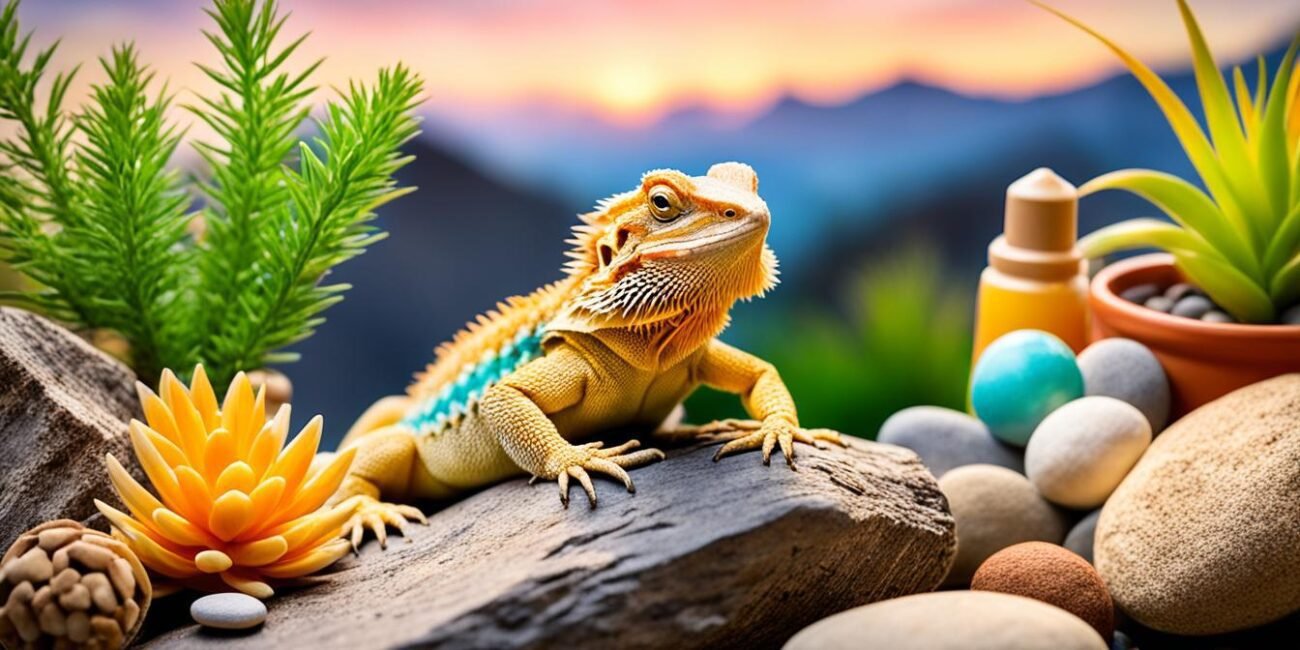
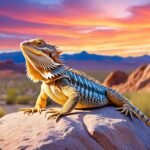
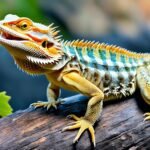


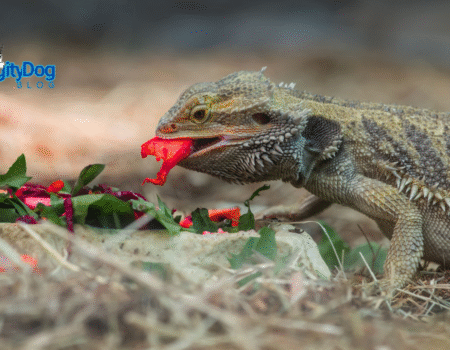
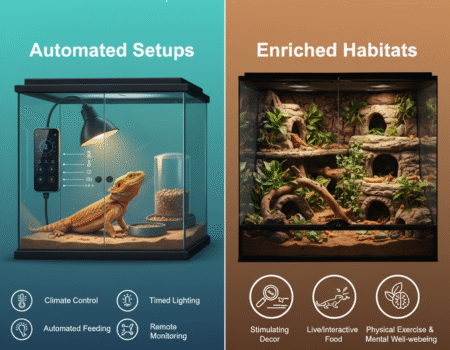
No Comment! Be the first one.